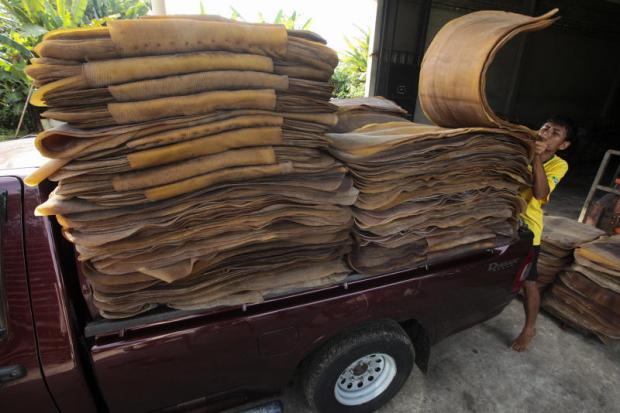More than 300,000 tonnes of rubber were sold at the Commerce Minister’s business matching event for the industry, with more orders expected to follow to help boost demand for the commodity.

A worker loads up a truck with rubber sheets to be taken to a processing plant in Surat Thani province. PATIPAT JANTHONG
Commerce Minister Apiradi Tantraporn said yesterday’s event gathered more than 100 Thai and foreign rubber companies and generated up to 15 billion baht of rubber trade.
The event created the potential for joint ventures in the future that may create more demand to absorb rising supply, she added.
“More than 100 rubber importers from 26 countries joined the event and around 300,000 tonnes of rubber were sold, and we expect more orders to come in after we brought buyers to meet sellers,” said Mrs Apiradi.
She said the ministry aims to invite major rubber buyers, particularly tyre makers from China, South Korea, Europe, the US and Middle East to look for raw materials here to replenish stocks.
Tyre production normally takes up over 60% of global rubber production of more than 12 million tonnes a year.
Thailand is the world’s biggest producer and exporter of rubber, producing around 4.5 million tonnes a year, around 37% of global production.
For the first six months of 2017 (January-June), Thailand rubber product export value reached 113 billion baht, up 55% from the previous year.
Natural Thai rubber prices have been falling over the past few years largely due to oversupply from major rubber-producing countries as the weak global economy cut demand in the auto industry — and for natural rubber eventually.
The benchmark export-grade Thai smoked rubber sheet (RSS3) has fallen 12% from 60.50 baht per kilogramme last year to 55 baht, sparking concerns among Thai rubber farmers, mostly in the southern region where roughly 65% of the country’s annual output comes from.
Rubber prices are well below the 148 baht per kilogramme seen in 2011, when they hit a record high due to strong demand at a time when oil prices were surging, pushing the price of synthetic rubber, an alternative to petroleum-based rubber, higher and encouraging global tyre makers to switch to natural rubber.
Apart from accelerated rubber sales through export channels, the government has also encouraged businesses, state agencies and education institutes to switch to more local-made natural rubber to help boost domestic demand.
The government aims to increase the proportion of domestic use to more than 10% in order to cut heavy reliance on export, which allows importers in other countries to dictate prices.
However, exporters and industry officials say they expect rubber prices to begin recovering in the second half of this year, rising by around 10-15% to stabilise at around 60-70 baht on higher demand.
In contrast, supply should subside since the southern region of Thailand is due to enter the dry season, when rubber trees shed their leaves and produce less latex.
- BangkokPost




























